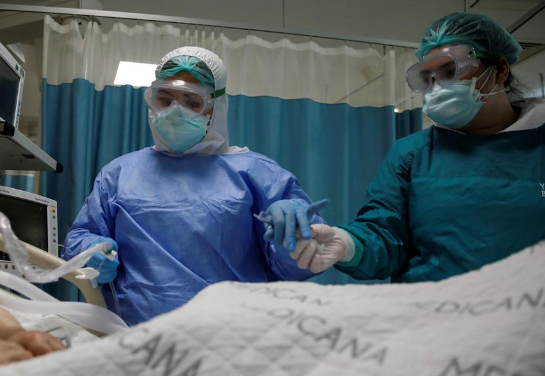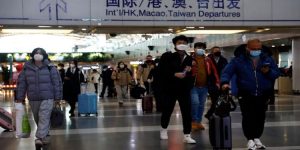Nurses and other health care workers on the frontlines of COVID-19 deserve to be recognised for their lifesaving efforts and personal sacrifices amid increased medical risk. That was the message issued in a joint statement by the International Council of Nurses and the International Red Cross and Red Crescent Movement to mark International Nurses Day on May 12.
Join the world of sports this Wednesday on National Nurses Day, as we honor the frontline healthcare heroes who inspire us. Create your own “jersey” in their honor and tag your post with #TheRealHeroes to help cheer your hero on! pic.twitter.com/7Nr7qpwV19
— John Cena (@JohnCena) May 4, 2020
This comes as more than 90 000 health care workers worldwide, possibly even double that number, are believed to have been infected with COVID-19 while the disease has claimed the lives of at least 260 nurses.
Nurses give so much of themselves to others every day – selflessly nursing the world to health. #InternationalNurseDay pic.twitter.com/wWvGpoS4zl
— Back to Nature (@WeGoBack2Nature) May 11, 2020
Cristina Cadenas is a nurse working at a University Hospital in Madrid Spain, one of the hardest-hit countries in Europe. She was one of 10 health workers in her department to contract the virus and spent one month recovering from it before returning to work.
“We all have a lot of contact with the patients because we are dealing directly with them, but I think the nursing assistants and nurses are more at risk because you deal directly with them practically the entire working day. You help them get washed, to dress and there is very close contact. Although my ward wasn’t that complicated because it is a traumatology ward, there was an infected (COVID-19) patient and we didn’t know it, so I think that’s where we all caught the virus.”
But she is one of the lucky ones with current estimates of hundreds of nurses dying from the virus.
A profession that sees people risking their own health and that of their families, to help save the lives of others.
International Nurses Day (IND) is an international day observed around the world on 12 May (the anniversary of Florence Nightingale’s birth) of each year, to mark the contributions that nurses make to society.
We salute the Nurses for their Devotion and Priceless Efforts. pic.twitter.com/UbsEgGt4Og
— Mishal Welfare Organization (@MishalWelfare) May 11, 2020
CEO of the International Council of Nurses, Howard Catton explains: “In the last few weeks, we have seen the reports of the deaths of nurses increase from 100 to more than 260. The figure for health care worker infections rises from 23 000 to we think more than 90 000, but that is still an under-estimation because it is not every country in the world. We know that there are currently 3.5 million reported cases of coronavirus around the world. If the average health care worker infection rate – about six percent we think – is applied to that, the figure globally could be more than 200 000 health worker infections today.”
With persistent concerns that the pandemic is putting pressure on medical staff and health systems to a breaking point, especially in vulnerable and fragile settings.
Catton adds: “We are still receiving reports of shortages of personal protective equipment, an issue not just for hospitals, but for people in care homes or staff who are looking after people in their own homes as well. We believe that the lack of supplies of personal protective equipment is related to the increase in infection rates that we have seen amongst health care workers. We think it is also highlighting that countries around the world were just not prepared enough. They didn’t have the stockpiles of PPE. We went into this pandemic six million short of a number of nurses that we need as well.”
Some frontline workers, like this Brazilian ICU nurse Ednar Perreira, have also faced a growing tide of hostility towards them, after being verbally attacked upon entering a public bus in Sao Paulo.
“I was leaving the service and entering the trolleybus and when I got on the trolleybus, together with two nurses, the passengers were extremely shocked because I was wearing a shirt written ‘nursing’. Then someone said ‘Our contaminated ones got on the bus’. What did we do? We went to the end of the bus, because as people turned their heads and put on their masks thinking I was going to contaminate someone.”
And while death to a large extent has defined the tragedy of this virus, it’s the nurses and healthcare workers who’ve also defined the small victories amidst all of it. Here, dancing and celebrating the recovery of a patient who spent 45 days battling the virus in their hospital in Orange, California. Or UK-based New Zealand ICU nurse Jenny McGee who was publicly thanked by British Prime Minister Boris Johnson after he recovered from COVID-19.
“All, all, all of our intensive care shifts are really tough for whatever reason. I think there was a lot of media interest about him being in hospital and to be honest that is probably was the toughest thing of the lot. As a unit he was just another patient, we were trying to do our best for, so it was business as usual.”
Essential workers to the core, and despite the obstacles they’ve encountered during the coronavirus outbreak, heroes to so many everywhere.






